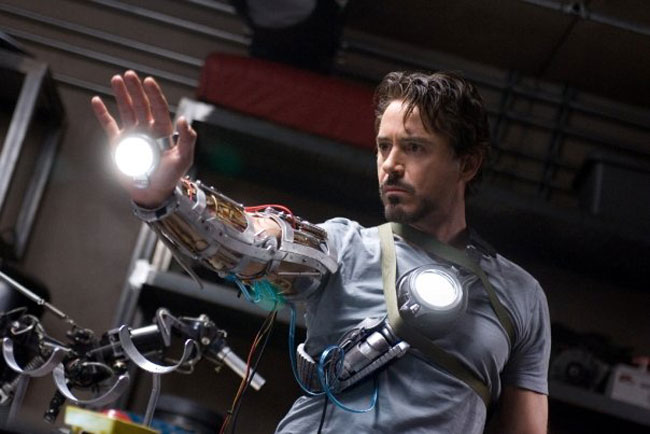'Iron Man' Hero Personifies Modern Military Contractors

When superhero Tony Stark isn't donning his Iron Man armor to personally rough up villains, he's pitching the U.S. military on new gadgets to fight the War on Terror.
"They say the best weapon is one you never have to fire," Stark tells a group of military officers in the "Iron Man" film that opens today. "I prefer the weapon you only have to fire once."
The Marvel comic book character's suit embodies a futuristic technology that may enhance human capabilities in war, but the current battlefield belongs to a growing swarm of unmanned aerial vehicles (UAV) and robots that could someday give even Iron Man a run for his money. UAVs clocked more than 500,000 hours in the air by the beginning of 2008, performing many of the tasks normally done by piloted aircraft.
"There's a scene of Iron Man flying against [F-22] Raptors," said Pete Singer, Brookings Institute defense expert and author of the forthcoming book "Wired for War." "Those are among the last generation of manned fighter jets."
Someone still needs to develop and sell those manned or unmanned technologies, and that's where Stark might be the new face of military contractors. Private individuals and companies might not be as visible as UAVs soaring above the skies of Afghanistan and Iraq, yet their role has grown just as dramatically during the recent conflicts.
Howard Hughes, the original Halliburton
Tony Stark, played by Robert Downey Jr., is based partly on real-life wealthy industrialist Howard Hughes, who lent his eccentric genius and financial resources to oddball U.S. military efforts during World War II and the Cold War.
Get the world’s most fascinating discoveries delivered straight to your inbox.
Hughes built and piloted many of his own aircraft, including the Hughes H-1 Racer that he flew to set a transcontinental airspeed record in 1937.
"He was really doing this sort of thing even before there was a military-industrial complex," said Alex Roland, military historian at Duke University. He compared Hughes to a "one-man Halliburton empire," referring to one of the largest defense contractors currently working in Iraq.
The military-industrial complex really took off in the 1950s as the United States sought new weapons and technologies for its growing military, which gave Hughes and other military contractors a market to sell everything from helicopters to satellites.
Yet some Hughes projects contracted by the military simply fizzled. The all-wood "Spruce Goose" remains the largest plane ever built; it was meant to carry troops safely across the Atlantic during World War II, but was completed after the war and flew just once. Another effort that foundered involved building a secret ship that could raise a sunken Soviet nuclear submarine from the bottom of the Pacific.
Such doomed investments were just one symptom of the troubles that plagued the early military-industrial complex. A "revolving door" allowed military officers to join companies that they had just awarded defense contracts to, while private executives went to work for the Pentagon and funneled contracts back to their companies, Roland said. He added that tightened regulations now prevent many of those earlier abuses of the system.
Cycles of military spending
Still, those powerful interests combined with the cry of "how much is enough for defense?" during the Cold War to make a seemingly irresistible call for bigger and pricier weapons, according to Roland.
And the military-industrial complex remains hungry today for increased funding. Private companies are eager for contracts, the military looks for next-generation weapons, and some in Congress jockey for new defense-related jobs for their districts.
"That's how Dad did it, that's how America does it and it's worked out pretty well so far," Stark says in the movie.
Roland observed that U.S. military spending has gone up and down in cycles largely unrelated to the constant pressure from the military-industrial complex, with spikes in 1940, 1960, 1980 and again during the Bush administration.
The trouble arises when the sense of national urgency that accompanies those spikes can lead to relaxed government oversight, just as millions of new defense dollars suddenly become available and companies rush in. Such has been the case with the latest boost in military spending, Roland said.
However, there's now the additional twist of reduced competition among contractors.
"From 1986 to 2006, the number of Pentagon prime contractors competing on major defense programs went from twenty to six," said Singer, the Brookings Institute defense expert. "There's often just two going at it, competing on both sides of [contract] bundles, so that they win no matter what."
'Minimal competition'
That reduced competition among major contractors may contribute to problems of inefficiency, Singer said.
Budget overruns and delays for weapon systems appear to be the rule. The Government Accountability Office found that 95 major defense systems exceeded their budgets by $295 billion collectively in a March 2008 report, including an upgraded version of the F-22 Raptors that duel with Stark in "Iron Man."
But even noncompetitive, no-bid contracts are "perfectly legitimate under certain circumstances," said James Jay Carafano, senior fellow at the Heritage Foundation and retired U.S. Army Lt. Colonel. The U.S. military awarded such contracts to get on a war footing quickly and invade Iraq.
Now that U.S. efforts have switched to providing long-term security and reconstruction, though, experts say contracts should be more competitive to boost efficiency.
Corruption and waste among contractors and local officials in Iraq caused the Special Inspector General for Iraq Reconstruction to deem the problem the "second insurgency" in 2007, according to the Associated Press.
"There's minimal competition with very few eyes and ears watching the contracting," Singer noted. "Should you be surprised to be billed for one hundred guys working on a site, if you never visited to see if there were even ten?"
Singer blamed the government for acting like a "stupid client." Carafano agreed, adding that the sudden flood of military spending resulted in poorly defined contracts hastily given out.
"It's not about greedy contractors, it's not about backdoor deals, and it's not about politicians making sure certain companies get contracts," Carafano said. "It's about the government not being a very good customer."
Who is on the front lines?
Whatever happens, no one questions that the United States could not fight a war now without outsourcing to military contractors.
"Do you always get value for your money? Not always, but generally, yes you do," Carafano said. "These wars wouldn't be possible without private sector support."
That means military contractors have also expanded beyond just selling military hardware. They now run supply lines, feed troops, build base camps, consult on strategy and even fight as private security forces.
"Companies don't just build the weapons of war, they provide the personnel to use it," Singer said. "They provide the service side of war. That's a pretty historic shift."
The change amounted to more than 180,000 Americans, Iraqis and other nationals working as private contractors in Iraq as of July 2007, exceeding the 163,000 U.S. troops there at the time. Some of those contractors necessarily carry guns in their line of work.
Movie audiences probably won't be troubled by Iron Man dealing out vigilante justice, but experts question how to hold military contractors accountable for their actions if things go badly. Private individuals work in a murky area where no law seems to apply, leading to incidents such as the shooting of Iraqi civilians by guards working for the private military company Blackwater.
"Every human endeavor has bad apples, and that's true whether you're talking about the real world or a comic book world," Singer said. "But do you have a system in place to ensure that the bad apples are punished?"
There's no need to worry about Tony Stark, though. He is, by cinematic definition, one of the good guys.



